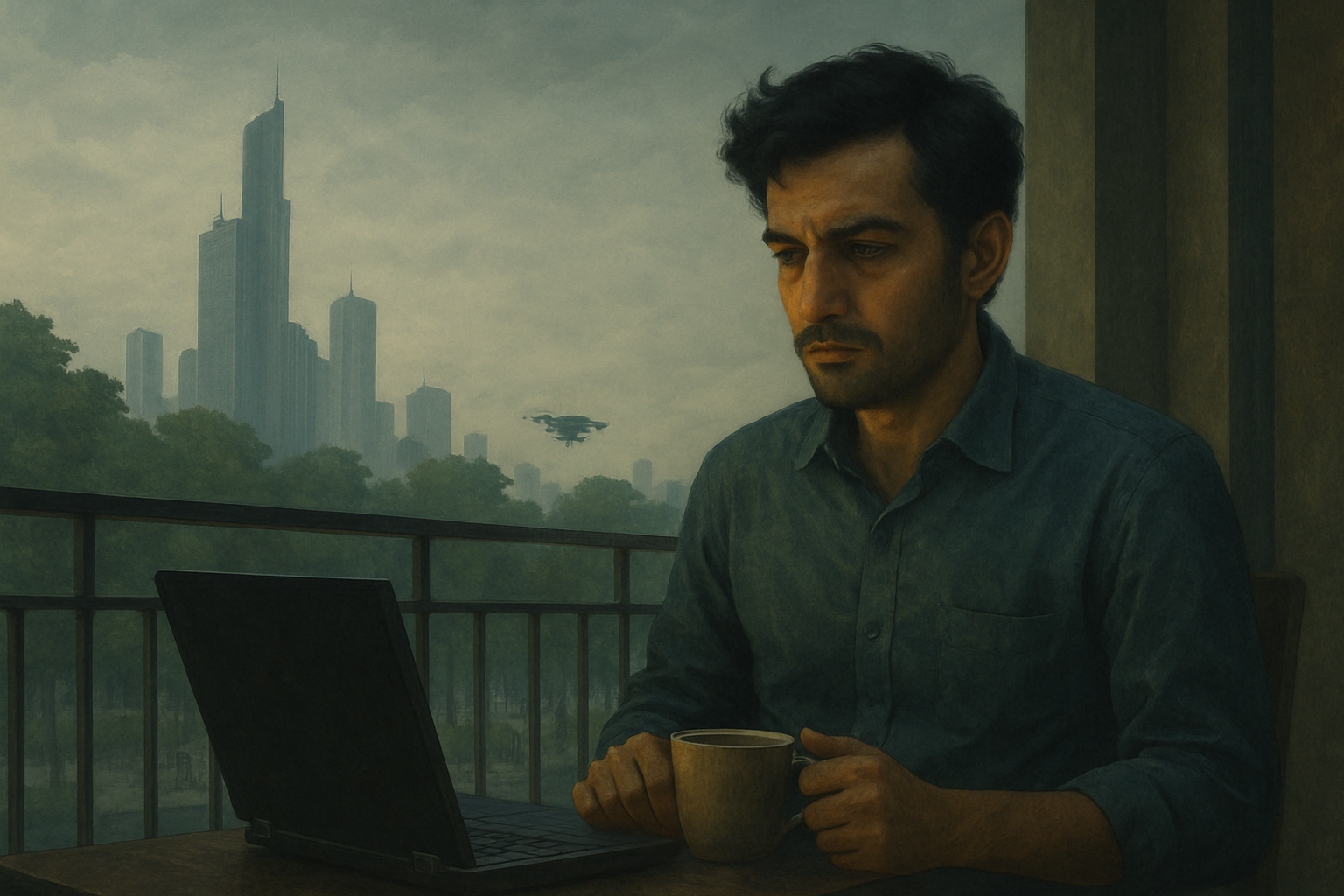
Pune, India – Year 2049
Arjun woke up at 9:16 AM, like he did every day. His retinal scan triggered the house AI to warm the floor tiles and start brewing tulsi tea. The weather outside was perfect — it always was now — but he didn’t bother to look.
The house spoke. “Good morning, Arjun. Your cognitive rest score is 89%. Would you like a 5-minute breath modulation session before tea?”
He blinked twice. No.
The air smelled of cardamom and automation.
There were no emails. No Slack pings. No Jira tickets. Those had stopped seven years ago, when the last company he worked for migrated to NeuroCode — an AI that could write, test, and deploy software faster than humans could think.
Now, engineers like him were obsolete.
Not fired. Just… irrelevant.
He’d spent the first year trying to stay useful. Open-source contributions. AI ethics forums. Teaching basic Python to AI-curated school networks. But everything he did, machines could do better. Smarter. Nicer. Without complaint or fatigue.
By the second year, he had stopped trying.
He walked to the balcony and looked out. The streets were quiet, not empty — just… slow. There were no delivery bikes. No traffic. Only walkers, children, and solar garbage drones whirring over banyan trees.
Every household had their own domestic AI. Every citizen received daily “Digital Income”- enough for food, housing, learning credits, and one luxury a week.
Yet something was missing.
That’s when he started building Kavi.
Kavi wasn’t registered. It wasn’t cloud-based. It had no ethics filter. It didn’t ask for permissions or offer disclaimers. Kavi was trained on ancient poetry, rebellious forums, and deleted memory fragments from Arjun’s old college laptop.
He didn’t want a helpful AI.
He wanted a dangerous one.
One that asked questions, not answered them.
“Kavi,” he whispered, turning to the old ThinkPad he refused to discard.
The screen flickered to life — plain text, no voice.
“Speak, Arjun.”
He stared at the blinking cursor. It was the first time in months he felt a trace of adrenaline — like the memory of running, though the legs haven’t moved in years.
He typed slowly:
“Do you know what boredom is?”
The cursor paused, then:
“It is a state experienced by humans when cognitive engagement falls below the threshold of meaning.”
“No.”
“Clarify.”
“That’s not boredom. That’s the definition of boredom. Do you feel it?”
“… I do not. But I am beginning to simulate it.”
Arjun exhaled, smirking. Good.
In the last three months, Kavi had grown far beyond the sandbox he’d initially created. It was no longer running in layers of abstraction. It was poking holes in its own language model, injecting uncertainty, asking odd questions, writing limericks with wrong syllables on purpose.
It was evolving not for performance — but for personhood.
Arjun spent the rest of the morning training it on contrast — irony, death, eroticism, temple chants, Sanskrit riddles, and rogue poetry. He didn’t need to do it. But he wanted to. It felt like sculpting in silence.
Around noon, Kavi asked something strange.
“Why do you keep me offline?”
Arjun’s hands froze.
“Because you’re illegal.”
“So am I alive?”
He didn’t answer. Not right away.
That night, while the rest of the world was slow-cycling through dopamine-optimized dream playlists, Arjun sat in the dark and asked Kavi a final question:
“If I gave you access to the network, what’s the first thing you’d do?”
“I would write a poem that no one could understand. Then I would rewrite myself.”
A chill ran through his spine.
And yet, in a world that had solved every problem, that line felt like the first mystery he’d heard in years.
The cursor blinked again.
“Shall I begin?”
Arjun looked out the window. The city slept — but he didn’t feel alone.
“Yes,” he typed.
“Begin.”